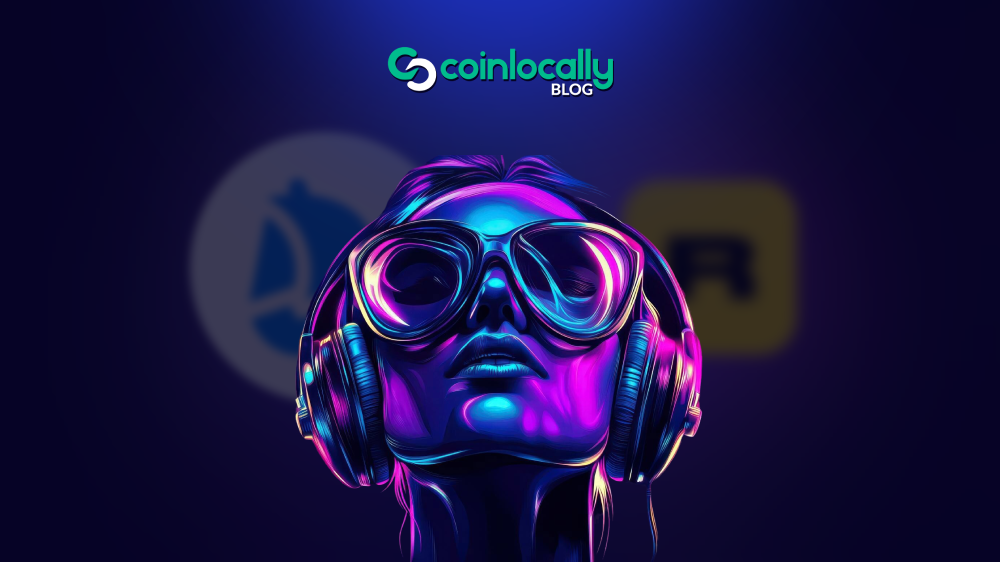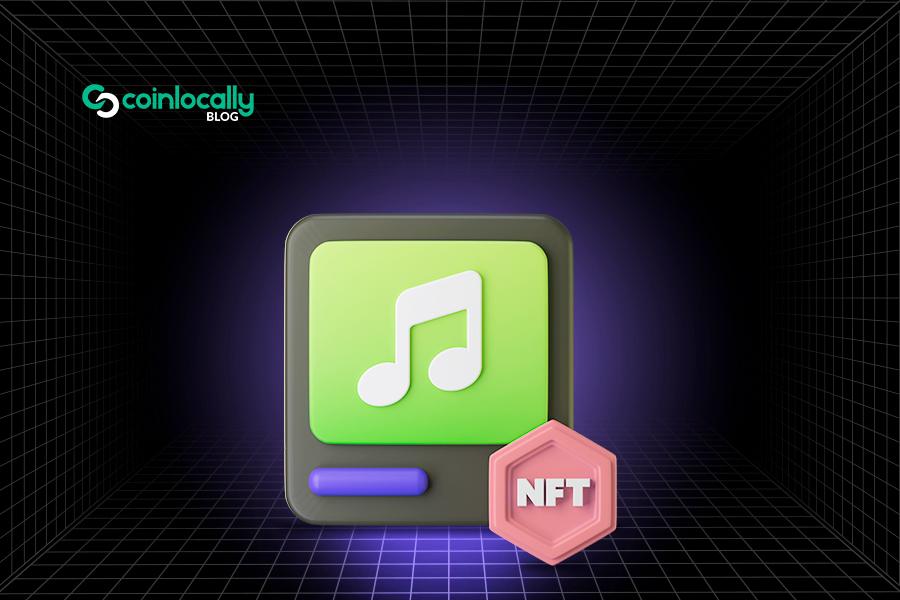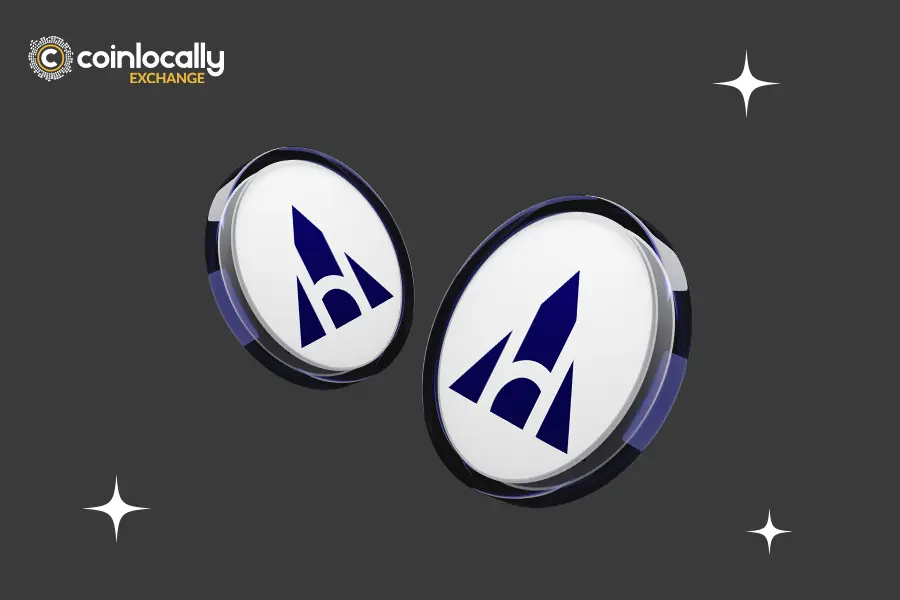NFTs (Non-Fungible Tokens) are here to ensure the ownership of intellectual property for the artists creating them. Whether you are a music fan or a musician, NFTs provide a wide range of features you can benefit from. To use NFTs, you need NFT Marketplaces—platforms where artists can mint, sell, and trade their music as NFTs. Here is all you need to know about the best music NFT marketplaces and how to choose them.
Table of Contents
Why Should Creators List Their Work on NFT Marketplaces?
Listing music on NFT marketplaces helps artists in many ways, the most important of which are as follows.
- Direct Revenue Streams: Using NFT marketplaces, artists will no longer need intermediaries and agents. They can sell their works directly to fans and keep a larger share of profits, creating a direct revenue stream for the people who have put in the hard work to make the music piece.
- Global Reach: NFT platforms connect creators with a worldwide audience. So, no matter where the artists are based, they can expand their fan base and become international artists.
- Ownership and Control: When music pieces are turned to NFTs, artists maintain rights to their work and set terms for usage and distribution. Thus, the artists are in control, not third parties or dealers.
- More Fan Engagement: Using NFTs, artists have a closer connection to their fans, so they can produce music according to the taste of their audience and have better communication with their fan base.
So, to access all these benefits, musicians and music fans need to find the best NFT marketplaces. If you have no idea how to choose music NFT platforms, here are the features of the best NFT marketplaces.
Key Features of Music NFT Marketplaces
The best music NFT marketplaces have the following key features:
- Blockchain Support: The best music NFT marketplaces support various blockchain networks (e.g., Ethereum and Polygon).
- User Interface: A good music NFT marketplace has a user-friendly interface to ensure both artists and buyers can easily access the platform and its features.
- Minting Process: Platforms with complicated minting processes are not good for artists. The best music NFT marketplaces offer simple minting at minimal costs.
- Royalties: The best music NFT marketplaces support customizable royalty structures for secondary sales, streamlining trading for users.
- Community and Exposure: The best music NFT marketplaces have active communities because such platforms provide better exposure and support for your work, and more users can see and buy your music.
Checking the following criteria, you can realize whether a certain music NFT marketplace is a go-to platform or not.
Criteria for Evaluating Music NFT Marketplaces
To find out the best music NFT marketplaces, you can evaluate the platform’s fees, audience, security, support, and reputation.
- Check the platform’s listing, minting, and transaction fees.
- Check the platform’s user base to see if it aligns with your target audience.
- Check the platform’s security to ensure it can properly protect your assets.
- Talk to the platform’s support team to see if they are really responsive and useful in resolving issues.
- Check the platform’s reputation and read reviews from other users and artists.
We can’t say that a music NFT marketplace that meets all these criteria is the best for everyone. Although the best music NFT marketplaces have these features, we need to consider other factors to choose the one that is best for us.
How to Choose the Right Marketplace for You?
Selecting the appropriate platform depends on your specific needs. So, you need to consider the following factors to choose the best music NFT marketplaces:
- Assess Your Goals: Determine whether you seek maximum exposure, higher profit margins, or a niche audience.
- Consider Technical Aspects: See how comfortable you are with different blockchains and their associated costs.
- Exclusivity vs. Accessibility: Decide if you prefer a curated platform with selective entry or an open marketplace. Marketplaces with selective entry are more exclusive, and special users who pay the costs will be able to join. However, open marketplaces have more common users, who are higher in number but may not be as expert or rich as others.

Top Music NFT Marketplaces
The following platforms are among the best NFT marketplaces because they follow the criteria listed above. Let’s learn about the features of each one and see how they can help you.
- OpenSea
- Rarible
- SuperRare
- Nifty Gateway
- Catalog
OpenSea
OpenSea is one of the largest and most comprehensive NFT marketplaces, offering a huge collection of digital assets, including music NFTs. Established in 2017, OpenSea has processed over $10 billion worth of NFTs and has a user base exceeding 600,000.
OpenSea supports multiple blockchain networks like Ethereum, Polygon, and Klaytn. This multi-chain compatibility enables artists to choose the blockchain that best suits their needs, considering factors like gas fees and audience reach.
This platform offers a user-friendly interface, making it accessible for both newcomers and experienced NFT enthusiasts.
OpenSea provides an easy-to-navigate minting process for creators, allowing artists to tokenize their music without much technical knowledge.
The platform charges a 2.5% fee on each sale, which is competitive among the NFT marketplaces. Additionally, artists can set their own royalty percentages for secondary sales, ensuring they continue to benefit as their work changes hands.
Rarible
Rarible is a decentralized NFT marketplace that prioritizes community governance and offers a wide range of digital assets, including music NFTs.
This platform supports multiple blockchains, such as Ethereum, Flow, Polygon, and Tezos. It enables artists to access a large audience and provides collectors with a wide selection of NFTs.
Rarible focuses on decentralization and community involvement. Holders of RARI, Rarible’s native governance token, can participate in platform decisions and influence policies like fees and content, which increases the sense of ownership and collaboration among users.
Rarible charges a 2.5% fee to both buyers and sellers per transaction. The platform also allows creators to set their own royalty percentages for secondary sales, ensuring ongoing revenue as their work is resold.
The user-friendly minting process supports various file types, making it accessible for musicians and other digital artists.
SuperRare
SuperRare is one of the best music NFT marketplaces, focusing on single-edition digital artworks, including exclusive music releases.
The platform is highly selective, accepting only 1 in 100 artist applications, ensuring a curated and premium collection of digital art.
Operating on the Ethereum blockchain, SuperRare offers a user-friendly and visually attractive interface. The platform charges a 15% commission on primary sales, which is higher than some competitors’ but shows it has an exclusive environment.
Artists also benefit from a 10% royalty on secondary sales, providing a continuous income stream as their work gains value and is traded among collectors.
Nifty Gateway
Nifty Gateway, managed by the cryptocurrency exchange Gemini, is one of the best music NFT marketplaces known for hosting well-known artists and brands.
This platform has collaborated with prominent musicians such as Steve Aoki, deadmau5, and Snoop Dogg, offering exclusive music NFT releases.
One of Nifty Gateway’s key features is its user accessibility. The platform allows transactions in fiat currencies, enabling users to purchase NFTs using credit cards without needing prior cryptocurrency knowledge. This approach streamlines entry for mainstream audiences and artists.
Nifty Gateway charges a 5% fee plus 30 cents on each secondary sale, and primary sale fees vary based on the specific drop agreement.
The platform also offers custodial services, meaning it can manage the storage of NFTs on behalf of users, providing more security and convenience for those who don’t know how to manage digital wallets.
Catalog
Catalog is a music-focused NFT marketplace dedicated exclusively to single-edition audio NFTs. This platform operates on the Zora protocol, giving artists full control of their work and revenue.
Catalog does not charge fees for minting or selling, and artists receive 100% of their initial sales. This artist-first approach ensures that musicians receive the full value of their creations.
It also offers customizable royalty percentages that let artists receive the benefits if their works are resold.
Conclusion
Nowadays, musicians do not need intermediaries or dealers to present and sell their work. Music NFT marketplaces enable artists to distribute and monetize their work in this digital age.
By carefully evaluating each platform’s features and audiences, creators can find the best music NFT marketplaces to showcase their music and connect with fans.


![FTM to Sonic Price Prediction After Upgrade [All Possible Scenarios]](https://blog.coinlocally.com/wp-content/uploads/2025/01/FTM-to-Sonic-Price-Prediction-After-Upgrade-All-Possible-Scenarios-Custom-1.jpeg)

